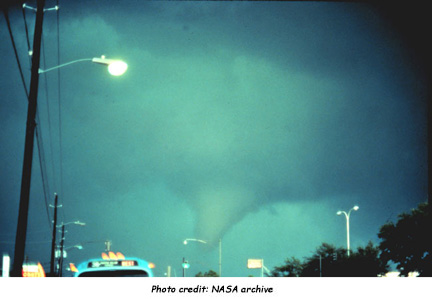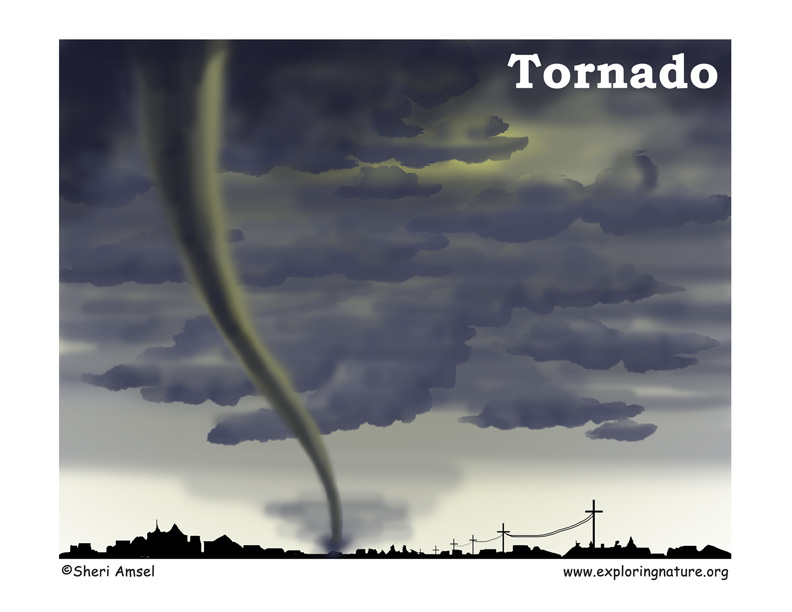

A tornado is also called a twister or cyclone. It is a spinning, funnel-shaped cloud with huge power. It moves along the ground grabbing, blowing and mixing up everything in its path, like a big blender. Tornadoes usually spin counterclockwise. They spin around a center of low pressure. They can be just a few feet wide to a mile wide. Most tornadoes are between 300 - 2,000 feet wide. Their wind power can reach more than 300 miles per hour. This kind of strong wind can tear the roof off a house. It can flip a car or crush a mobile home. It can cost a town millions of dollars in damage. Many lives can also be lost when a tornado does through a town.
The United States has more tornadoes every year than anywhere else in the world. In recent years, there have been about 1,000 tornadoes per year. Every tornado can damage the town through which it passes. Most tornadoes form in the Central Plains. In the Central Plains the air in the spring is warm and humid. and sits under cooler dry air. This is an unstable atmosphere. Strong wind shear can then form big thunderstorms that spin off tornados. Any state can have a tornado, but the Central Plains states have them every year. That area is nicknamed – tornado alley.
Tornadoes begin to form in a thundercloud. Then they stretch down to the ground, swirling up dust. This is the early stage of the tornado called the dust-whirl stage. As the tornado grows stronger it enters the organizing stage. Then its gets wider, taller and stronger and enters its mature stage. This is the most dangerous stage. This is when tornadoes do the most damage on the ground. After that, a tornado will begin to lose power. It will enter the shrinking stage. Here is begins to tilt. It becomes thinner on the ground. Finally, it enters the decay stage. It begins to stretch and wiggle like a rope. Most tornadoes do not reach the mature stage. They break down and melt away instead. Most tornadoes only last a few minutes. They can do serious damage in their short lives though. One powerful thunderstorm can create many tornadoes. This is called a tornado outbreak.
Tornadoes are born from thunderstorms. A single big thunderstorm (supercell) can spin off many tornadoes. The most powerful tornadoes form in April when the wind shear is strongest. The biggest number of tornadoes form in May – about 6 a day. They usually form late in the afternoon. This is when the atmosphere is most unstable from the sun heating the Earth’s surface.
Tornadoes are so dangerous because they have strong winds. Tornado winds are strong enough to crush houses, pick up big things (like cars, houses, trees and even people) and carry them miles away before dropping them. Tornadoes can hurl objects as if they were shot out of a cannon.
There have been many bad tornadoes in U.S. history. There is nothing we can do to stop them. The only thing people can do is go to a safe place to hide until the storm is over. People in tornado alley have storm cellars or places in their town to go to in case of a tornado. They just have to get there in time. Tornadoes can travel fast and the people may only have minutes to get to safety. The National Weather Service tracks bad thunderstorms they send out warnings about the possible path of a tornado. This gives people a chance to get to safety if the twister comes to their town. Many towns in this tornado alley have town sirens. They go off if a tornado is coming. This lots people not watching TV or listening to radio know to take cover. It saves lives.
A day with many bad tornadoes was April 11, 1965. It started with a big thunderstorm that spread through many states. The storm spun off many tornados. By the end of the day, 250 people had died. 1,500 people were hurt. The high winds knocked down power lines. So the U. S. Weather Bureau (Now the National Weather Service) could not get warnings to the towns where the tornadoes were headed. This tragedy helped start up the tornado warning system. This now warns people of a coming storm, even if the electricity has been cut off.
Tornadoes are a fact of life for those who live in tornado alley. Even if we can track tornados, all we can do is warn people to take cover. We cannot stop tornadoes.
On May 4th 2007, there was a big thunderstorm that lasted for more than 6 hours. It spun off 22 tornadoes. The National Weather Service watched the storm. It sent off a warning to Greensburg, Kansas, a town of 1,500 people who were in the tornado’s path. It was a very powerful category EF-5 tornado (the most powerful tornadoes on record). It had winds of 250 mph. The tornado leveled the town. It killed 11 people and injured 60 more. If they had not had the warning, many more people would have died. Tornado warnings don’t stop tornadoes, but they give people the best chance they have to ride out the storm somewhere safe.
When you research information you must cite the reference. Citing for websites is different from citing from books, magazines and periodicals. The style of citing shown here is from the MLA Style Citations (Modern Language Association).
When citing a WEBSITE the general format is as follows.
Author Last Name, First Name(s). "Title: Subtitle of Part of Web Page, if appropriate." Title: Subtitle: Section of Page if appropriate. Sponsoring/Publishing Agency, If Given. Additional significant descriptive information. Date of Electronic Publication or other Date, such as Last Updated. Day Month Year of access < URL >.
Amsel, Sheri. "Storms - Tornadoes" Exploring Nature Educational Resource ©2005-2025. January 25, 2025
< http://www.exploringnature.org/db/view/Storms-Tornadoes >

